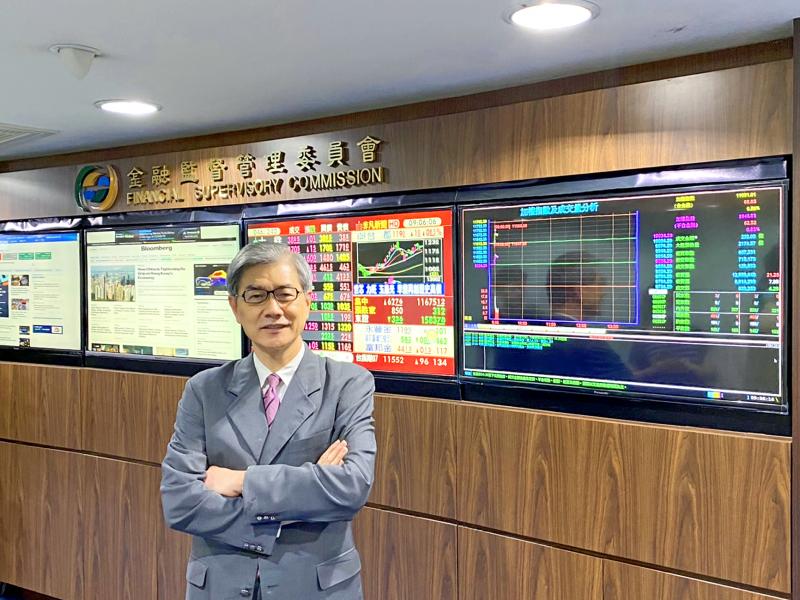The Financial Supervisory Commission (FSC) plans to introduce new policies later this year to help companies list on the local stock market, Chairman Thomas Huang (黃天牧) said in an interview yesterday.
There have only been nine IPOs so far this year, lagging far behind the commission’s target of 52 for the whole year, as the COVID-19 pandemic has affected companies’ financial performance in the first half of the year and disrupted their listing plans, Huang said.
Under current rules, companies must be profitable to qualify for listing, while those with sizable net value and large revenue, or select biotech firms recommended by the government can apply to hold IPOs.

Photo: Kao Shih-ching, Taipei Times
In view of the pandemic, the commission is considering allowing the Taiwan Stock Exchange and Taipei Exchange to use companies’ earnings results in the third quarter when reviewing their IPO qualifications, Huang said.
“We are not lowering our standards. We want to help companies mitigate the effect of the pandemic and continue their fundraising plan,” Huang said, adding that the commission would announce the new measures next month.
The commission has not trimmed its target number for IPOs, although listing activity would inevitably slow due to the pandemic, he said.
It is on schedule to implement odd-lot intraday trading in October, allowing investors to buy shares in quantities of less than 1,000 during regular trading hours, he said.
More than 60 local brokerages have expressed a willingness to handle the new service, up from 10 last year, he added.
In June next year, the Taiwan Stock Exchange is to introduce a market-making system to improve liquidity for companies that are financially sound, but not popular among investors, he added.
As for the development of open banking in Taiwan, the commission would allow banks by the end of this year to cooperate with third-party service providers to share consumer data with other banks after gaining consumers’ consent, he said.
Overall, local financial firms would remain resilient and overcome challenges due to the pandemic and global rate cuts, he said.
“I think insurers should be able to adapt to changes in the business environment, although they are sensitive to market volatility,” he said.
As local banks have been supportive in providing loans to those affected by the pandemic, the commission has seldom received complaints from companies, he said.
However, banks’ profitability might weaken slightly as they provide relief loans, he added.

In Italy’s storied gold-making hubs, jewelers are reworking their designs to trim gold content as they race to blunt the effect of record prices and appeal to shoppers watching their budgets. Gold prices hit a record high on Thursday, surging near US$5,600 an ounce, more than double a year ago as geopolitical concerns and jitters over trade pushed investors toward the safe-haven asset. The rally is putting undue pressure on small artisans as they face mounting demands from customers, including international brands, to produce cheaper items, from signature pieces to wedding rings, according to interviews with four independent jewelers in Italy’s main

Japanese Prime Minister Sanae Takaichi has talked up the benefits of a weaker yen in a campaign speech, adopting a tone at odds with her finance ministry, which has refused to rule out any options to counter excessive foreign exchange volatility. Takaichi later softened her stance, saying she did not have a preference for the yen’s direction. “People say the weak yen is bad right now, but for export industries, it’s a major opportunity,” Takaichi said on Saturday at a rally for Liberal Democratic Party candidate Daishiro Yamagiwa in Kanagawa Prefecture ahead of a snap election on Sunday. “Whether it’s selling food or

CONCERNS: Tech companies investing in AI businesses that purchase their products have raised questions among investors that they are artificially propping up demand Nvidia Corp chief executive officer Jensen Huang (黃仁勳) on Saturday said that the company would be participating in OpenAI’s latest funding round, describing it as potentially “the largest investment we’ve ever made.” “We will invest a great deal of money,” Huang told reporters while visiting Taipei. “I believe in OpenAI. The work that they do is incredible. They’re one of the most consequential companies of our time.” Huang did not say exactly how much Nvidia might contribute, but described the investment as “huge.” “Let Sam announce how much he’s going to raise — it’s for him to decide,” Huang said, referring to OpenAI

The global server market is expected to grow 12.8 percent annually this year, with artificial intelligence (AI) servers projected to account for 16.5 percent, driven by continued investment in AI infrastructure by major cloud service providers (CSPs), market researcher TrendForce Corp (集邦科技) said yesterday. Global AI server shipments this year are expected to increase 28 percent year-on-year to more than 2.7 million units, driven by sustained demand from CSPs and government sovereign cloud projects, TrendForce analyst Frank Kung (龔明德) told the Taipei Times. Demand for GPU-based AI servers, including Nvidia Corp’s GB and Vera Rubin rack systems, is expected to remain high,